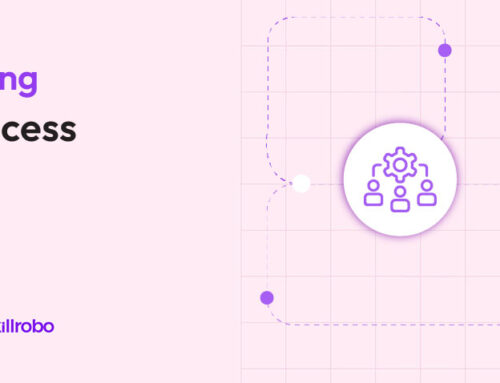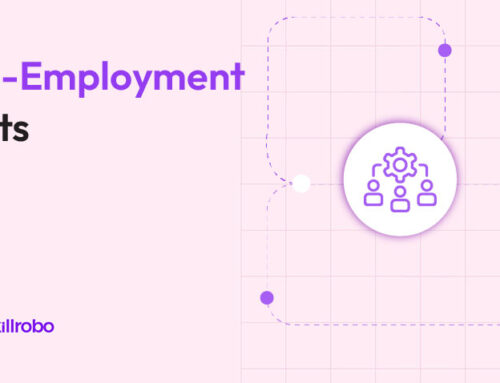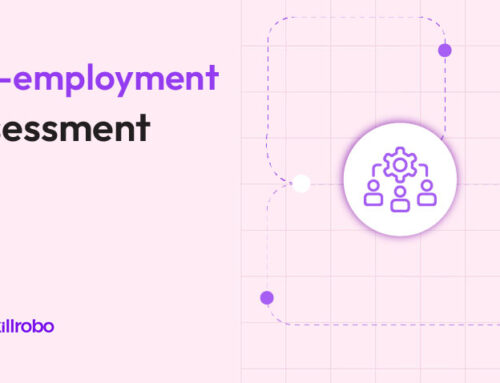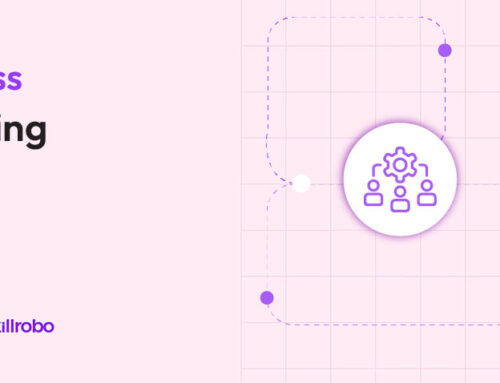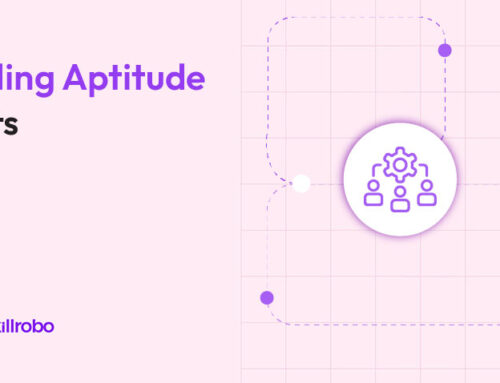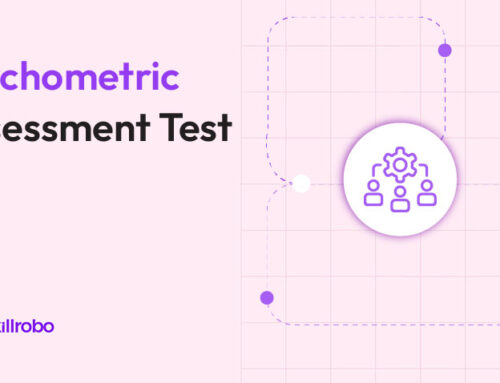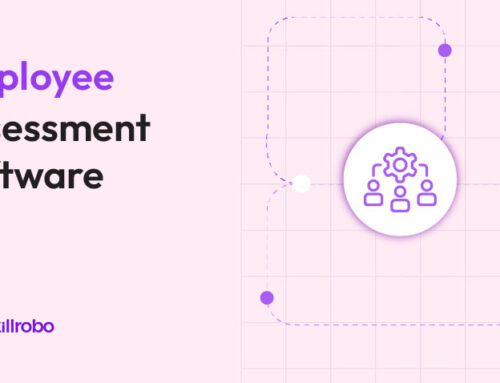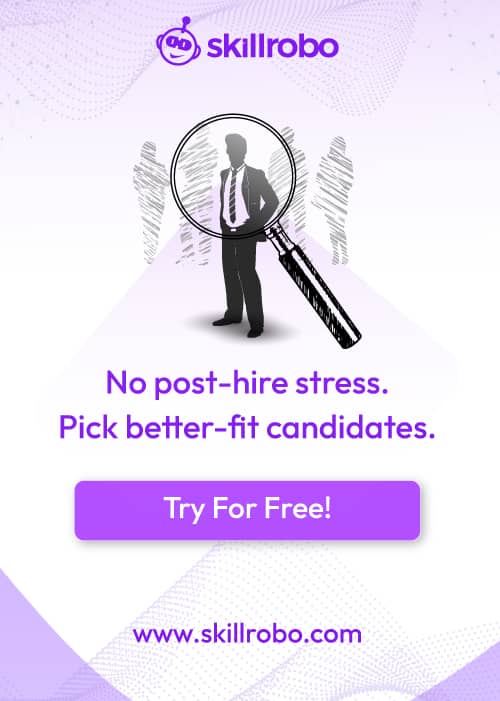Table of Contents
Related articles

Companies receive thousands of resumes for each job posting. Hiring the right talent by screening through the high volumes of resumes is a challenge that every company faces. The challenge is further amplified if the job position is labor-intensive, in-demand, and highly competitive. Companies look for candidates with the desired skill set and the ability to work in a professional environment to handle projects.
However, the ratio is 30-70 in terms of qualified vs unqualified candidates, and it behooves the employability criteria set by the company. These attributes specified by the company determine the screening process. The range of attributes is characterized by hard skills such as job competency, and technical knowledge, and soft skills such as interpersonal and communication skills and relevant experience.
Now the question arises, “How are hiring decisions made?” Well, the answer is to go beyond polished resumes, scripted answers, and pre-screened references. A better way to screen candidates is by employing a pre-employment assessment.
Pre-employment assessment software is a tool used for evaluating candidates’ skills with consistency. The assessment tool consists of a range of options for testing hard, soft, technical, and other skills using various kinds of assessment batteries. Personnel selection keeps changing to adapt to the changing technological world and the competitive business world. Though the traditional face-face interview is still typical, conducting a range of pre-employment skill tests can diversify the candidate selection.
Read on to know the types of skill tests you need to implement with pre-employment assessments, why you need them, and how to create a balanced employment assessment to hire the top talents in the field and create a standard format of assessment using tools like Skillrobo.
Artificial Intelligence (AI) is transforming traditional ways of hiring and recruitment. Recently LinkedIn ranked AI to be one of the top four recruiting ideas. AI is reinventing the pre-hire assessments. Companies using online pre-employment skills testing software and tools can replace the traditional pen-and-paper assessments where employers need to prepare around 60 to 70 questions related to the skills being tested. It consumes a substantial amount of time and commitment. Once the candidates complete the assessment, it has to be manually corrected.
Imagine around 80-100 candidates taking up the pen-and-paper assessment. Here is where the AI-integrated pre-employment assessment tool comes to the rescue and simplifies it. These tools come with a predefined set of questions that can be entirely conducted in an online environment.
Importance of having Pre-Employment Assessment
* Heuristics. To ease the cognitive load while making the hiring decision, you need to have pre-employment assessment software. While assessing the candidates, the employers incorporate heuristic strategies to make an educated guess in selecting the right talent without bias. One area where the heuristic strategies help recruiters is when they need to rely on two sources of information during the initial evaluation of the candidates. They are the candidates’ characteristics and their first impression of how they present themselves. Sometimes, recruiters rely on the categorical membership of the candidates and select them in a biased way, having gender and ethnicity as criteria. This negatively impacts the company’s image as well as the ability to attract top talents.
* You can easily streamline the hiring process with an online pre-employment testing tool. This is one of the most distinguishable benefits of pre-hire testing as it improves hiring efficiency. Using the right kind of tool, recruiters can swiftly gather important information about the applicants.
* Pre-employment assessment software can help improve hiring quality. It allows recruiters to locate the best-suited candidates for the company. In addition to this, unconscious bias, which is a big problem in the recruitment process, can be radically minimized. The results from the pre-employment testing tools can provide accurate insights into the strengths and weaknesses of the applicants. There are personality assessments to evaluate their interpersonal skills, attitude, and communication. When recruiters use these results, they can make an unbiased decision in finalizing the applicants.
* Since the results from the pre-employment testing are generally based on objective factors, you can increase the legal defensibility of the hiring decisions that your hiring team makes. The assessment factors remain consistent throughout the whole recruitment phase. In addition to this, the pre-employment assessment can enhance the hiring process’s legal defensibility only when it is used to measure the skill set of the applicants that is exactly related to the positions that they are applying for.
* Moreover, pre-employment assessments can effectively reduce employee turnover as they help in hiring the right fit for the company. Employee turnover is a costly problem for companies. Companies are always on the lookout for ways to minimize them.
Now with comprehending the importance of pre-employment skill testing, it is essential to know the different types of assessments that you need to consider. Before that, you need to know some of the essential hard, soft, and technical skills that companies look for in job candidates regularly.
Bag of Tricks
Personal attributes are the traits that each of us possesses, and these traits make us unique. These traits are evaluated by a recruiter to determine the effectiveness of the candidate. The career attributes, when combined with technical skills, can enhance a candidate’s job suitability.
Whether it is attitude or aptitude, you need to explore both the hard and soft skills of the applicants. A balance in skills is what makes them the right fit for open job positions. According to Zig Ziglar,
“attitude is more important than aptitude to determine altitude (success).”
The National Association of Colleges and Employers (NACE) and the Association of American Colleges and Universities (AAC&U) suggest that soft skills are deemed equally important to the technical expertise of the candidates.
The soft skills inventory includes:
- General communication, which includes writing, presenting, and listening skills
- Critical thinking
- Emotional intelligence
- Creativity
- Attention to detail
- Insight
- Confidence
- Teamwork
- Integrity
- Problem-solving
- Diversity
- Dedication
- Professionalism
- General and work ethics
- Time management
- Leadership
- Business Etiquette
- Flexibility
- Planning and organizing skills
- Ability to work under pressure
Some of the hard skills that a company should look for in a candidate include role-specific technical knowledge, computer skills, foreign language skills, SEO, coding skills, content management, proofreading, marketing skills, etc. The hard skills vary with the job position that the candidates have applied for. These are some of the career attributes that companies generally expect from applicants.
Now let’s look at the different types of tests that you can implement using pre-employment assessment.
Bolt from the Blue
When you ask candidates unusual questions, it strikes a chord immediately and helps them open up. Tony Hsieh, CEO of Zappos, says if someone is self-aware, they always strive to grow. If not, it would be harder for them to adapt and evolve beyond what they are and get stuck. Generally, candidates prepare for the usual interview and practice answers before speaking to the recruiter. They find smart ways to repel the negative questions and try to stay positive without admitting their weaknesses.
This strategy may seem good, but it backfires as the recruiters might find the candidates to be not completely honest. So, even when assessing the hard skills, it is necessary to set some unusual questions to challenge the candidates to showcase their full potential. Moreover, when using a pre-employment assessment, the software comes loaded with features to help recruiters simplify the hiring process.
Following are some of the types of tests to implement in a pre-employment assessment during end-to-end recruitment.
1) Job Specific Knowledge Tests
Resume fraud costs a company dearly, up to $600 Billion in a year, and 57% of candidates seem to lie about their skills in their resumes. The details provided in the resume may not always be 100% authentic. In general, these skills are assessed by presenting a series of scenarios and evaluating their response.
Moreover, these are the job skill tests that evaluate the technical knowledge of the candidates. They are generally binary tests that comprise questions to test the applicant’s proficiency. Think of hard skills as quantifiable and binary to measure precisely, for instance, if the candidate can code or not. Since these are quantifiable data, they can be evaluated in terms of test scores at the end of the assessment.
In addition to this, the questions can be made in such a way that they would assess the job simulation, domain knowledge, and problem-solving.
2) Cognitive Proficiency Tests
An online pre-employment skills testing includes aptitude tests that would evaluate the candidate’s potential in areas of verbal reasoning, critical thinking, problem-solving, numerical ability, decision-making, logical reasoning, etc. The tests in the cognitive proficiency assessments are designed to estimate the mental efficiency of the candidates – how they process information, how they approach and solve a problem, and their ability to learn and grasp new information.
It is a measure of mental ability. Some companies measure each category of cognitive proficiency assessments. The individual score from each category precisely provides insight into the candidates’ specific mental abilities.
3) Personality Tests
Especially in the 20th century, there has been a rise in the use of personality tests to match the ever-increasing competitiveness in the market. HR departments are starting to use these to enhance employee potential. These tests are useful in evaluating the applicant’s personality and evaluate their level of cultural fit. These tests are designed to reveal the applicants’ possible work patterns, attitudes, behavioral patterns, and personality traits.
Furthermore, it measures how candidates might respond to different work situations. Their behavioral competencies as the candidates work in a simulated work environment are also measured using these tests. The test results will provide better insight to the recruiters to make effective hiring decisions.
The personality tests are designed to test the critical five traits – openness, extraversion, conscientiousness, agreeableness, and neuroticism. When a candidate reveals these traits in their test – hire them. In addition to this, there are some dark behavioral traits that recruiters need to watch out for – self-obsession, opportunism, insensitivity, impulsiveness, temperamental, and thrill-seeking. When the level of these dark traits is greater in a candidate, they can get triggered with the slightest provocation.
Those employees might rub off their dark traits, and chances are they might affect their co-workers too. They have an innate tendency to misuse their power and create an environment where they need to control others. Carefully making questions to reveal these traits can help streamline the right candidates.
4) Role-based Tests
Role-based tests are typically done from the perspective of stakeholders. This is different from personality and behavioral tests. They are designed to make qualitative observations on how the candidates behave in a real-time work simulation. These types of pre-employment skill tests include questions to assess specific job functions and curate them accordingly.
There are three vital aspects in designing these tests where they test the candidates’ – domain expertise, aptitude, and behavioral attributes. These are a type of situational judgment assessment that will assess how the candidates choose the most appropriate skill to face workplace challenges.
5) Language Proficiency Test
Testing English language proficiency is a type of pre-employment assessment and is an important one. English being the global language of communication, recruiters need to evaluate the applicant’s fluency, grammar, proficiency, listening, and comprehension skills. Communication is the key factor for success, especially for job roles that involve constant interaction with customers and stakeholders.
Their English fluency needs to be at a professional level even if the candidates don’t speak English in their day-to-day lives. The language proficiency level requirement differs with organizations and the role that the candidates are applying for.
In addition to the above tests, there are tests to assess candidates’ learning agility, digital readiness, and remote work assessment. The learning agility tests give an idea about the candidates’ dynamism and overall potential in handling bottleneck situations. Digital readiness is another important assessment that needs to be assessed to know how they adapt to the digital transformation.
The remote work assessment includes evaluating their remote working competency, which is tested especially after COVID-19.
Well, now that you know the type of tests to integrate into your pre-employment assessment, it’s time to choose the best pre-employment assessment software – Skillrobo.
Skillrobo is online pre-employment testing that allows recruiters to create job-specific and industry-specific customized tests to screen candidates and hire top talents. It is effective and time-saving with loads of features.
Visit to know more and Sign Up for a free trial.

Companies receive thousands of resumes for each job posting. Hiring the right talent by screening through the high volumes of resumes is a challenge that every company faces. The challenge is further amplified if the job position is labor-intensive, in-demand, and highly competitive. Companies look for candidates with the desired skill set and the ability to work in a professional environment to handle projects.
However, the ratio is 30-70 in terms of qualified vs unqualified candidates, and it behooves the employability criteria set by the company. These attributes specified by the company determine the screening process. The range of attributes is characterized by hard skills such as job competency, and technical knowledge, and soft skills such as interpersonal and communication skills and relevant experience.
Now the question arises, “How are hiring decisions made?” Well, the answer is to go beyond polished resumes, scripted answers, and pre-screened references. A better way to screen candidates is by employing a pre-employment assessment.
Pre-employment assessment software is a tool used for evaluating candidates’ skills with consistency. The assessment tool consists of a range of options for testing hard, soft, technical, and other skills using various kinds of assessment batteries. Personnel selection keeps changing to adapt to the changing technological world and the competitive business world. Though the traditional face-face interview is still typical, conducting a range of pre-employment skill tests can diversify the candidate selection.
Read on to know the types of skill tests you need to implement with pre-employment assessments, why you need them, and how to create a balanced employment assessment to hire the top talents in the field and create a standard format of assessment using tools like Skillrobo.
Artificial Intelligence (AI) is transforming traditional ways of hiring and recruitment. Recently LinkedIn ranked AI to be one of the top four recruiting ideas. AI is reinventing the pre-hire assessments. Companies using online pre-employment skills testing software and tools can replace the traditional pen-and-paper assessments where employers need to prepare around 60 to 70 questions related to the skills being tested. It consumes a substantial amount of time and commitment. Once the candidates complete the assessment, it has to be manually corrected.
Imagine around 80-100 candidates taking up the pen-and-paper assessment. Here is where the AI-integrated pre-employment assessment tool comes to the rescue and simplifies it. These tools come with a predefined set of questions that can be entirely conducted in an online environment.
Importance of having Pre-Employment Assessment
* Heuristics. To ease the cognitive load while making the hiring decision, you need to have pre-employment assessment software. While assessing the candidates, the employers incorporate heuristic strategies to make an educated guess in selecting the right talent without bias. One area where the heuristic strategies help recruiters is when they need to rely on two sources of information during the initial evaluation of the candidates. They are the candidates’ characteristics and their first impression of how they present themselves. Sometimes, recruiters rely on the categorical membership of the candidates and select them in a biased way, having gender and ethnicity as criteria. This negatively impacts the company’s image as well as the ability to attract top talents.
* You can easily streamline the hiring process with an online pre-employment testing tool. This is one of the most distinguishable benefits of pre-hire testing as it improves hiring efficiency. Using the right kind of tool, recruiters can swiftly gather important information about the applicants.
* Pre-employment assessment software can help improve hiring quality. It allows recruiters to locate the best-suited candidates for the company. In addition to this, unconscious bias, which is a big problem in the recruitment process, can be radically minimized. The results from the pre-employment testing tools can provide accurate insights into the strengths and weaknesses of the applicants. There are personality assessments to evaluate their interpersonal skills, attitude, and communication. When recruiters use these results, they can make an unbiased decision in finalizing the applicants.
* Since the results from the pre-employment testing are generally based on objective factors, you can increase the legal defensibility of the hiring decisions that your hiring team makes. The assessment factors remain consistent throughout the whole recruitment phase. In addition to this, the pre-employment assessment can enhance the hiring process’s legal defensibility only when it is used to measure the skill set of the applicants that is exactly related to the positions that they are applying for.
* Moreover, pre-employment assessments can effectively reduce employee turnover as they help in hiring the right fit for the company. Employee turnover is a costly problem for companies. Companies are always on the lookout for ways to minimize them.
Now with comprehending the importance of pre-employment skill testing, it is essential to know the different types of assessments that you need to consider. Before that, you need to know some of the essential hard, soft, and technical skills that companies look for in job candidates regularly.
Bag of Tricks
Personal attributes are the traits that each of us possesses, and these traits make us unique. These traits are evaluated by a recruiter to determine the effectiveness of the candidate. The career attributes, when combined with technical skills, can enhance a candidate’s job suitability.
Whether it is attitude or aptitude, you need to explore both the hard and soft skills of the applicants. A balance in skills is what makes them the right fit for open job positions. According to Zig Ziglar,
“attitude is more important than aptitude to determine altitude (success).”
The National Association of Colleges and Employers (NACE) and the Association of American Colleges and Universities (AAC&U) suggest that soft skills are deemed equally important to the technical expertise of the candidates.
The soft skills inventory includes:
- General communication, which includes writing, presenting, and listening skills
- Critical thinking
- Emotional intelligence
- Creativity
- Attention to detail
- Insight
- Confidence
- Teamwork
- Integrity
- Problem-solving
- Diversity
- Dedication
- Professionalism
- General and work ethics
- Time management
- Leadership
- Business Etiquette
- Flexibility
- Planning and organizing skills
- Ability to work under pressure
Some of the hard skills that a company should look for in a candidate include role-specific technical knowledge, computer skills, foreign language skills, SEO, coding skills, content management, proofreading, marketing skills, etc. The hard skills vary with the job position that the candidates have applied for. These are some of the career attributes that companies generally expect from applicants.
Now let’s look at the different types of tests that you can implement using pre-employment assessment.
Bolt from the Blue
When you ask candidates unusual questions, it strikes a chord immediately and helps them open up. Tony Hsieh, CEO of Zappos, says if someone is self-aware, they always strive to grow. If not, it would be harder for them to adapt and evolve beyond what they are and get stuck. Generally, candidates prepare for the usual interview and practice answers before speaking to the recruiter. They find smart ways to repel the negative questions and try to stay positive without admitting their weaknesses.
This strategy may seem good, but it backfires as the recruiters might find the candidates to be not completely honest. So, even when assessing the hard skills, it is necessary to set some unusual questions to challenge the candidates to showcase their full potential. Moreover, when using a pre-employment assessment, the software comes loaded with features to help recruiters simplify the hiring process.
Following are some of the types of tests to implement in a pre-employment assessment during end-to-end recruitment.
1) Job Specific Knowledge Tests
Resume fraud costs a company dearly, up to $600 Billion in a year, and 57% of candidates seem to lie about their skills in their resumes. The details provided in the resume may not always be 100% authentic. In general, these skills are assessed by presenting a series of scenarios and evaluating their response.
Moreover, these are the job skill tests that evaluate the technical knowledge of the candidates. They are generally binary tests that comprise questions to test the applicant’s proficiency. Think of hard skills as quantifiable and binary to measure precisely, for instance, if the candidate can code or not. Since these are quantifiable data, they can be evaluated in terms of test scores at the end of the assessment.
In addition to this, the questions can be made in such a way that they would assess the job simulation, domain knowledge, and problem-solving.
2) Cognitive Proficiency Tests
An online pre-employment skills testing includes aptitude tests that would evaluate the candidate’s potential in areas of verbal reasoning, critical thinking, problem-solving, numerical ability, decision-making, logical reasoning, etc. The tests in the cognitive proficiency assessments are designed to estimate the mental efficiency of the candidates – how they process information, how they approach and solve a problem, and their ability to learn and grasp new information.
It is a measure of mental ability. Some companies measure each category of cognitive proficiency assessments. The individual score from each category precisely provides insight into the candidates’ specific mental abilities.
3) Personality Tests
Especially in the 20th century, there has been a rise in the use of personality tests to match the ever-increasing competitiveness in the market. HR departments are starting to use these to enhance employee potential. These tests are useful in evaluating the applicant’s personality and evaluate their level of cultural fit. These tests are designed to reveal the applicants’ possible work patterns, attitudes, behavioral patterns, and personality traits.
Furthermore, it measures how candidates might respond to different work situations. Their behavioral competencies as the candidates work in a simulated work environment are also measured using these tests. The test results will provide better insight to the recruiters to make effective hiring decisions.
The personality tests are designed to test the critical five traits – openness, extraversion, conscientiousness, agreeableness, and neuroticism. When a candidate reveals these traits in their test – hire them. In addition to this, there are some dark behavioral traits that recruiters need to watch out for – self-obsession, opportunism, insensitivity, impulsiveness, temperamental, and thrill-seeking. When the level of these dark traits is greater in a candidate, they can get triggered with the slightest provocation.
Those employees might rub off their dark traits, and chances are they might affect their co-workers too. They have an innate tendency to misuse their power and create an environment where they need to control others. Carefully making questions to reveal these traits can help streamline the right candidates.
4) Role-based Tests
Role-based tests are typically done from the perspective of stakeholders. This is different from personality and behavioral tests. They are designed to make qualitative observations on how the candidates behave in a real-time work simulation. These types of pre-employment skill tests include questions to assess specific job functions and curate them accordingly.
There are three vital aspects in designing these tests where they test the candidates’ – domain expertise, aptitude, and behavioral attributes. These are a type of situational judgment assessment that will assess how the candidates choose the most appropriate skill to face workplace challenges.
5) Language Proficiency Test
Testing English language proficiency is a type of pre-employment assessment and is an important one. English being the global language of communication, recruiters need to evaluate the applicant’s fluency, grammar, proficiency, listening, and comprehension skills. Communication is the key factor for success, especially for job roles that involve constant interaction with customers and stakeholders.
Their English fluency needs to be at a professional level even if the candidates don’t speak English in their day-to-day lives. The language proficiency level requirement differs with organizations and the role that the candidates are applying for.
In addition to the above tests, there are tests to assess candidates’ learning agility, digital readiness, and remote work assessment. The learning agility tests give an idea about the candidates’ dynamism and overall potential in handling bottleneck situations. Digital readiness is another important assessment that needs to be assessed to know how they adapt to the digital transformation.
The remote work assessment includes evaluating their remote working competency, which is tested especially after COVID-19.
Well, now that you know the type of tests to integrate into your pre-employment assessment, it’s time to choose the best pre-employment assessment software – Skillrobo.
Skillrobo is online pre-employment testing that allows recruiters to create job-specific and industry-specific customized tests to screen candidates and hire top talents. It is effective and time-saving with loads of features.
Visit to know more and Sign Up for a free trial.

